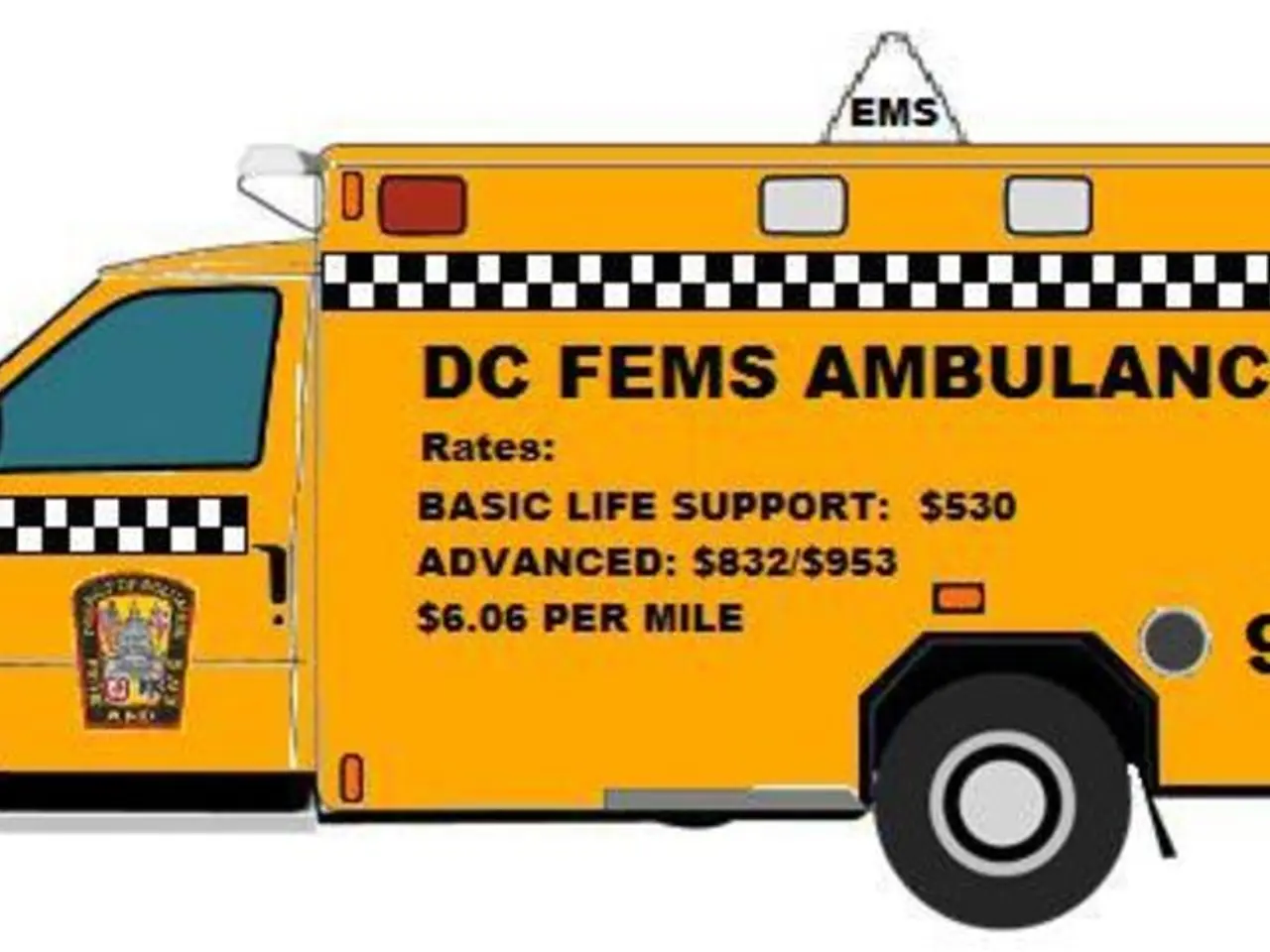The Consequences Unfolded When an Individual Experiences Cardiac Arrest
In the United States, over 356,000 cardiac arrests occur outside a hospital each year, with approximately 90% of these incidents resulting in death [1]. This alarming statistic underscores the importance of public awareness and preparedness when it comes to cardiac emergencies.
First and foremost, it's crucial to understand the difference between a heart attack and cardiac arrest. A heart attack, or myocardial infarction, is a circulation problem caused by a blockage in the arteries that supply blood to the heart muscle, leading to a reduction in oxygen delivery and potential damage to the heart muscle [2][4]. On the other hand, cardiac arrest is an electrical malfunction of the heart, where the heart suddenly stops beating effectively, causing an immediate loss of blood flow to the brain and other vital organs [1][2][3].
Cardiac arrest can stem from a known heart condition or occur suddenly and unexpectedly. Common causes include ventricular fibrillation, an irregular heartbeat [1]. In some cases, cardiac arrest may be triggered by a heart attack, but it is distinct from one.
In the event of a cardiac arrest, quick action can save lives. Bystander CPR saves lives in cardiac emergencies [2]. Hands-only CPR, which involves pushing hard and fast at the center of the chest at a rate of 100 to 120 beats per minute, is easier for the general public to learn and perform compared to conventional CPR [3].
The use of an Automated External Defibrillator (AED) is designed to be simple for those without prior experience. AEDs can reset the heart's natural rhythm during cardiac arrest [1]. Short videos demonstrate how to perform hands-only CPR, and if an AED is available, it should be used in conjunction with CPR [5].
Upon arrival at the hospital, anyone admitted following cardiac arrest will undergo testing to determine a cause and treatment protocol [6].
Preparedness is key in dealing with cardiac arrest. Making an emergency response plan for your household and checking for procedures in place for a cardiac arrest event at schools, community centers, and sporting facilities is essential [7]. Genetic conditions and hypertrophic cardiomyopathy (a thickening of heart muscle) can increase the risk of cardiac arrest [8].
Recently, we lost a beloved figure, Hulk Hogan, at the age of 71, following a cardiac arrest incident [9]. This tragic event serves as a reminder of the importance of understanding cardiac arrest and the need for timely action in emergency situations.
References: [1] American Heart Association. (2021). Sudden Cardiac Arrest. Retrieved from https://www.heart.org/en/health-topics/cardiac-arrest/about-cardiac-arrest/what-is-sudden-cardiac-arrest [2] American Heart Association. (2021). What's the Difference Between a Heart Attack and Sudden Cardiac Arrest? Retrieved from https://www.heart.org/en/health-topics/cardiac-arrest/about-cardiac-arrest/whats-the-difference-between-a-heart-attack-and-sudden-cardiac-arrest [3] American Heart Association. (2021). Hands-Only CPR. Retrieved from https://www.heart.org/en/health-topics/cardiac-arrest/hands-only-cpr [4] Mayo Clinic. (2021). Heart Attack. Retrieved from https://www.mayoclinic.org/diseases-conditions/heart-attack/symptoms-causes/syc-20351907 [5] American Heart Association. (2021). Using an AED. Retrieved from https://www.heart.org/en/health-topics/cardiac-arrest/about-cardiac-arrest/what-is-an-aed [6] American Heart Association. (2021). Cardiac Arrest: After the Emergency. Retrieved from https://www.heart.org/en/health-topics/cardiac-arrest/after-the-emergency/cardiac-arrest-after-the-emergency [7] American Heart Association. (2021). Prepare for an Emergency. Retrieved from https://www.heart.org/en/health-topics/cardiac-arrest/about-cardiac-arrest/prepare-for-an-emergency [8] American Heart Association. (2021). Conditions That Increase Risk of Cardiac Arrest. Retrieved from https://www.heart.org/en/health-topics/cardiac-arrest/about-cardiac-arrest/conditions-that-increase-risk-of-cardiac-arrest [9] CNN. (2021). Hulk Hogan dead at 71, his family says. Retrieved from https://www.cnn.com/2021/10/25/entertainment/hulk-hogan-dead/index.html
- To combat the high number of cardiac arrest incidents in the United States, it's essential to understand the distinction between heart attacks and cardiac arrest and be prepared for emergencies.
- Hulk Hogan, a renowned figure in entertainment, passed away following a cardiac arrest, emphasizing the importance of public awareness and preparedness.
- Mental health, while not directly linked to cardiac arrest, is a significant aspect of health-and-wellness, and managing stress levels can help prevent chronic diseases that may increase the risk of cardiac arrest.
- Recent advancements in science and medical-conditions research aim to develop new treatments for chronic diseases, potentially reducing the numbers of cardiac arrest incidents.




